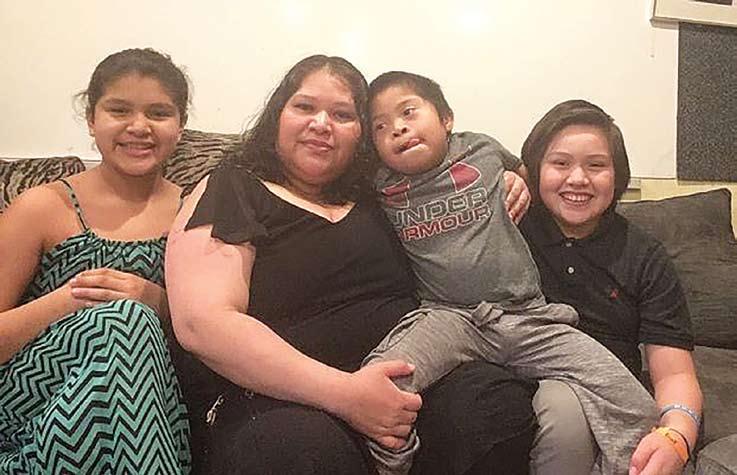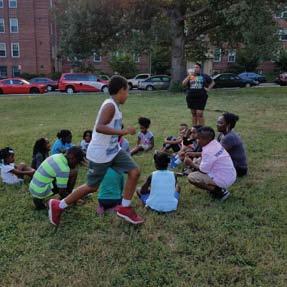
11 minute read
On ICE:A woman avoiding
On ICE
Rosa Gutierrez Lopez and her children
Advertisement
Rosa Gutierrez Lopez has spent 18 months avoiding ICE at a Maryland church. She hopes the COVID-19 quarantine will help people better understand her ordeal.
By Will Lennon and Anahi Hurtado
Contibuting Writers While much of the United States saw spikes in COVID-19 infections, infection rates in D.C. and its suburbs skewed downward in June. Judging from cell phone data, the key to the trend may have been social distancing. Maryland and D.C. residents spent much of their first month of summer indoors.
As a result of the decline, both Maryland and the District are taking cautious steps toward lifting restrictions. For some, it’s not happening fast enough. The Reopen Maryland Facebook group describes itself as a coalition of “citizens concerned about the impact of mass shutdowns … committed to peaceful advocacy for public health measures that respect Marylanders’ civil rights and economic well being.” The group has roughly 6,400 members. (In an ironic twist, one of its founders tested positive for COVID-19 in late June.)
Things are moving in Reopen Maryland’s preferred direction, though probably not as quickly as they’d like. Non-essential businesses, including nail salons and tattoo parlors, have opened their doors with social distancing measures in place. In many parts of the District and Maryland, people are back to shopping, getting manicures, and hitting the casinos.
Among those cautiously venturing outdoors is Rosa Gutierrez Lopez, a longtime area resident and an immigrant from El Salvador. In the past few weeks, Gutierrez Lopez has donned a mask and gone out into her community to take short walks with her three children.
The difference between Gutierrez Lopez’s situation and others is this: Most of those breathing a sigh of relief after stints in quarantine have been sheltering in place for a matter of months, while Gutierrez Lopez has taken sanctuary at Cedar Lane Unitarian Universalist Church in Bethesda for more than a year.
When Gutierrez Lopez immigrated from El Salvador in 2005, she requested asylum. She misunderstood the paperwork given to her by a Texas court—it was written in English and she primarily spoke Spanish— and the misunderstanding led to a missed court date. The court then ordered Gutierrez Lopez deported, and since she wasn’t present to hear the order issued, she didn’t find out about the deportation order until several years later.
Gutierrez Lopez found a lawyer in 2014 who was able to keep Immigration and Customs Enforcement at bay for a few years, but in 2017 she was given a deadline to return to El Salvador, a country she had fled after being subjected to threats and harassment. By that time, she had put down roots in Virginia, where she was living with her children and working as a cook in an Italian restaurant.
Gutierrez Lopez nearly complied with the deportation order and had already bought a plane ticket back to El Salvador when she discovered another option that would allow her to avoid being separated from her kids.
ICE designates churches as one of the “sensitive locations” where the agency rarely conducts enforcement. The policy turns church properties into sanctuaries for an undocumented person trying to avoid deportation offficers, provided the church is willing to provide the person with room and board.
Cedar Lane voted to offer undocumented people sanctuary a year and a half prior to Gutierrez Lopez’s hour of need.
“As a congregation, we are living our faith, resisting the unjust and family-fracturing immigration policies of our government, and broadening our social justice community,” says a page describing the sanctuary policy on Cedar Lane’s website.
Gutierrez Lopez missed her flight to El Salvador and became the first undocumented person to take the church up on their offer. On Cedar Lane’s property, she could be safe. Leaving for even a day would mean exposure to ICE and potential deportation.
Fortunately, the church is located on a sprawling, green campus just outside the Beltway. Before the COVID-19 crisis, a robust coalition of volunteers helped Gutierrez Lopez with errands and groceries and shuttled her children to and from doctors’ appointments, shopping trips, and even afternoon outings to zoos and museums. Meanwhile, Gutierrez Lopez kept busy. Aside from taking care of her children, she used her skills as a cook and organizer to help the church with fundraisers. She also took an interest in learning about the histories of oppressive governments that rose to power in the 1940s.
The pandemic’s arrival in Maryland exacerbated the challenges of living in sanctuary. The volunteer network that had once helped Gutierrez Lopez get her children to and from their appointments was forced to mostly disband.
“Now we need to stay home,” Gutierrez Lopez says in an interview conducted via Zoom. “We sometimes walk around in the grounds, but never too far. We always have that fear of getting sick … I am at risk to the virus because I have a high sugar level, and my son is at risk because with his Down syndrome he has a low immune system.”
Gutierrez Lopez’s son with Down syndrome is her youngest. He and his brother are still in elementary school. Their sister recently became a teenager. Before the pandemic, the three were able to transfer to public schools in Montgomery County and join their mother in sanctuary. (Before that, they lived with pastors from Gutierrez Lopez’s church in Virginia.)
Like others threatened by the virus, Gutierrez Lopez is experiencing both the relief of leaving her shelter for the first time in months and the threat posed by COVID-19. But fears of the virus are compounded by fears of ICE, of the conditions inside the agency’s notorious detention centers (many of which have seen COVID outbreaks), and of the threat of deportation to El Salvador, a country racked with civil unrest and gang violence.
“Being here in the church, I can’t leave, but I know that my life is protected, that nothing will happen to me,” Guttierez Lopez says. “That is the difference between being in El Salvador and being here.”
Gutierrez Lopez often communicates with her niece who is still in El Salvador through WhatsApp. The two are as close as mother and daughter and speak every day.
Earlier this month, El Salvador was devastated when Tropical Storm Amanda gave way to flooding and mudslides. Fourteen people were killed before the storm softened into a tropical depression. Gutierrez Lopez’s niece was unharmed, as was the rest of her family, but it pained Gutierrez Lopez to see people in El Salvador suffering and dying.
“I would cry when I watched the news because I felt such an impotence since I couldn’t help,” Gutierrez Lopez says. “I could only pray for these people that lost their lives and the ones that are left with nothing, pray that the government can give them a hand and help them.”
Gutierrez Lopez also frequently speaks with friends from a group chat she has with other women living in sanctuary. Recently, they discussed how an experience with quarantine might help Americans better understand the trials of undocumented people who find their movements restricted by forces beyond their control.
“The perspective has changed a lot because people have never been in quarantine. They’ve never been in a situation like mine,” Gutierrez Lopez says. “They say, ‘It’s so hard to be in a house and not leave.’ … At least they have the privilege to go to stores to buy necessities, go out to buy food, or go walk outside with a mask. We do not have that privilege.”
Being restricted to the church was Gutierrez Lopez’s reality for more than a year, but recently her situation has changed. Since May, she has been able to cautiously venture outside, thanks to a stay of removal secured by her lawyer. The stay freezes her deportation order for 60 days.
Ironically, by the time the stay of removal was granted, much of the world that Gutierrez Lopez had sealed herself off from in 2018 had been shut down due to COVID-19. Even more ironic: It was COVID-19 that helped set the conditions for Gutierrez Lopez to secure her stay of removal in the first place.
One of the main reasons Gutierrez Lopez couldn’t do anything about the removal order in her name was because, to request a stay of removal, she would have had to appear at an ICE field office. This presented a classic Catch-22, since an undocumented immigrant showing up at an ICE field office was liable to get detained and deported based on the very order they were trying to get deferred.
However, because of a change in ICE policy made in the wake of the pandemic, Gutierrez Lopez was able to request a stay of removal by mail. The request was granted, and its protection allows her to venture beyond the church’s property line, free from the imminent threat of ICE. Still, Guttierez Living in the City Lopez’s movements remain severely restricted. She has to communicate with ICE A virtual benefit to support Housing Up about any plans to leave the D.C. area for more than 48 hours, and she has to wear a GPS tracking bracelet wherever she goes. Gutierrez Lopez’s lawyer told DCist that her client’s children were a major factor in ICE’s decision. If Gutierrez Lopez remained restricted to Cedar Lane’s campus, she would have been unable to accompany her kids to the hospital if they contracted COVID-19. (Although both churches and hospitals are “sensitive locations,” the trip from one to the other could be treacherous.) Until the end of July, Gutierrez Lopez is free to cautiously move about her community, not so unlike other Marylanders. After the stay expires, ICE could renew it for another two months. Her deportation order could be nullified and the Board of Immigration Appeals could reopen her asylum case. That would present her with a path toward leaving Cedar Lane and remaining in the United States. Or, none of that could happen, and Gutierrez Lopez could wind up back at Cedar Lane, stuck in sanctuary for an indefinite period. According to Associate Minister Rev. Katie Romano Griffin, the church is prepared to offer sanctuary until Gutierrez Lopez “is able to be treated with Justice, Equity and Compassion by our legal system.” Despite progress made in June, CASH IN ON THE OVER 3.4 MILLION IN TOTAL CASH PRIZES! Living in the City A virtual benefit to support Housing Up October 5, 2020 at 7 PM Join us in building thriving communities in DC. Visit housingup.org/LITC to register! Living in the City A virtual benefit to support Housing Up October 5, 2020 at 7 PM Join us in building thriving communities in DC. Visit housingup.org/LITC to register! Living in the City A virtual benefit to support Housing Up October 5, 2020 at 7 PM Join us in building thriving communities in DC. Visit housingup.org/LITC to register! Living in the City A virtual benefit to support Housing Up October 5, 2020 at 7 PM Join us in building thriving communities in DC. Visit housingup.org/LITC to register! Living in the City A virtual benefit to support Housing Up October 5, 2020 at 7 PM Join us in building thriving communities in DC. Visit housingup.org/LITC to register! October 5, 2020 at 7 PM Join us in building thriving communities in DC. Visit housingup.org/LITC to register! Living in the City A virtual benefit to support Housing Up October 5, 2020 at 7 PM Join us in building thriving communities in DC. Visit housingup.org/LITC to register! Living in the City A virtual benefit to support Housing Up October 5, 2020 at 7 PM Join us in building thriving communities in DC. Visit housingup.org/LITC to register! Living in the City A virtual benefit to support Housing Up October 5, 2020 at 7 PM Join us in building thriving communities in DC. Visit housingup.org/LITC to register! reopening is far from a sure thing in Maryland. July has seen the rate of Maryland’s positive COVID-19 tests hit their highest levels in a month. (The state reported 925 new cases on Sunday, July 19.) Maryland has not announced plans to roll back in-progress reopening measures, but Governor Larry Hogan put out a press release encouraging bars and restaurants to double down on enforcing capacity and social-distancing restrictions. Different states have handled similar situations in their own ways—Texas paused its reopening after a spike in late June, but when Florida saw a spike, they went on with reopening Disneyworld.
Even in the best-case scenario, in which social distancing reduces the spread of COVID-19 until a safe vaccine is synthesized, mass-produced, and distributed equitably across the United States, Gutierrez Lopez Wash. City Paper | 1/4 pg V | 4.85” x 5.54” | 4c | New | July Scratcher Wash. City Paper | 1/4 pg V | 4.85” x 5.54” | 4c | New | July Scratcher may still face uncertainty. The forces that threaten to keep her locked indoors are as pervasive as any virus, and they threaten to linger long after her neighbors can go SUPPORT OUR JOURNALISM. maskless to Safeway and Starbucks. “Maybe now that people are in quarantine, they will see how difficult it is to be in one BECOME A MEMBER. place without leaving,” Gutierrez Lopez says. “I have been here a year and a half and I have not despaired. I wait patiently.” washingtoncitypaper.com/membership























